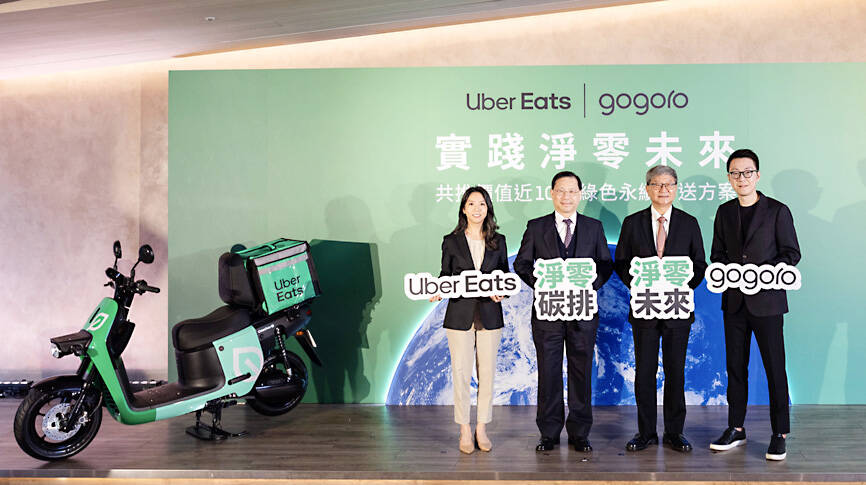Gogoro Inc (睿能創意) is working with Uber Eats to push for a faster switch to green mobility among the latter’s food delivery drivers in Taiwan, the electric scooter maker said yesterday.
The two firms are to offer a NT$6,000 subsidy for delivery drivers to purchase new Gogoro vehicles under a two-year partnership, it said in a joint statement.
Delivery drivers would also receive discounts on new battery-swapping programs from Gogoro, the statement said.

Photo courtesy of Gogoro Inc
The company has deployed 2,800 battery-swapping systems in Taiwan.
Up to 16,000 delivery drivers are expected to replace their scooters with new Gogoro models over the next two years, Uber Eats Taiwan general manager Chai Lee (李佳穎) told a news conference in Taipei.
The companies expect the Green Mobility Program to double the number of electric vehicle trips to 40 percent of overall trips by 2025, from 20 percent currently.
“It would bring cleaner air to cities across Taiwan,” Lee said.
As both companies have grown globally, they hope to expand their collaboration to more markets beyond Taiwan.
In Taiwan, about 26 percent of food and parcel delivery riders of electric scooters utilize Gogogro’s battery swapping system through 2,800 stations, according to the electric scooter supplier.
“We expect to see this strategic partnership in many more countries and markets soon,” Gogoro Taiwan general manager Henry Chiang (姜家煒) said.
Asked whether India would be the next destination for the companies’ green-mobility push, Chiang said they are exploring all sorts of potential collaborations.
Looking forward, Gogoro’s strategy next year would be expanding its sales networks, including adding more small neighborhood stores and broadening its product portfolios with different price ranges for target riders, he said.
Gogoro has opened 200 neighborhood stores so far this year, surpassing its target of 150 stores.

SEMICONDUCTORS: The German laser and plasma generator company will expand its local services as its specialized offerings support Taiwan’s semiconductor industries Trumpf SE + Co KG, a global leader in supplying laser technology and plasma generators used in chip production, is expanding its investments in Taiwan in an effort to deeply integrate into the global semiconductor supply chain in the pursuit of growth. The company, headquartered in Ditzingen, Germany, has invested significantly in a newly inaugurated regional technical center for plasma generators in Taoyuan, its latest expansion in Taiwan after being engaged in various industries for more than 25 years. The center, the first of its kind Trumpf built outside Germany, aims to serve customers from Taiwan, Japan, Southeast Asia and South Korea,

Gasoline and diesel prices at domestic fuel stations are to fall NT$0.2 per liter this week, down for a second consecutive week, CPC Corp, Taiwan (台灣中油) and Formosa Petrochemical Corp (台塑石化) announced yesterday. Effective today, gasoline prices at CPC and Formosa stations are to drop to NT$26.4, NT$27.9 and NT$29.9 per liter for 92, 95 and 98-octane unleaded gasoline respectively, the companies said in separate statements. The price of premium diesel is to fall to NT$24.8 per liter at CPC stations and NT$24.6 at Formosa pumps, they said. The price adjustments came even as international crude oil prices rose last week, as traders

POWERING UP: PSUs for AI servers made up about 50% of Delta’s total server PSU revenue during the first three quarters of last year, the company said Power supply and electronic components maker Delta Electronics Inc (台達電) reported record-high revenue of NT$161.61 billion (US$5.11 billion) for last quarter and said it remains positive about this quarter. Last quarter’s figure was up 7.6 percent from the previous quarter and 41.51 percent higher than a year earlier, and largely in line with Yuanta Securities Investment Consulting Co’s (元大投顧) forecast of NT$160 billion. Delta’s annual revenue last year rose 31.76 percent year-on-year to NT$554.89 billion, also a record high for the company. Its strong performance reflected continued demand for high-performance power solutions and advanced liquid-cooling products used in artificial intelligence (AI) data centers,

SIZE MATTERS: TSMC started phasing out 8-inch wafer production last year, while Samsung is more aggressively retiring 8-inch capacity, TrendForce said Chipmakers are expected to raise prices of 8-inch wafers by up to 20 percent this year on concern over supply constraints as major contract chipmakers Taiwan Semiconductor Manufacturing Co (TSMC, 台積電) and Samsung Electronics Co gradually retire less advanced wafer capacity, TrendForce Corp (集邦科技) said yesterday. It is the first significant across-the-board price hike since a global semiconductor correction in 2023, the Taipei-based market researcher said in a report. Global 8-inch wafer capacity slid 0.3 percent year-on-year last year, although 8-inch wafer prices still hovered at relatively stable levels throughout the year, TrendForce said. The downward trend is expected to continue this year,